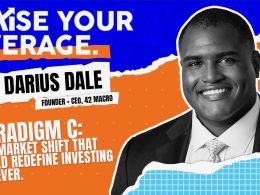An exclusive interview with Financial Thought Leader Charles Ellis about “what it takes” to be the best in the business. Ellis shares fifty years of wisdom learned from advising firms and governments on where to invest. Originally Broadcast on May 3, 2013.
Full Transcript:
CONSUELO MACK: This week on WealthTrack, what does it take to be the best in the business? Legendary financial consultant and thought leader Charles Ellis gives us his lifetime course from his new book, What It Takes: Seven Secrets of Success from the World’s Greatest Professional Firms. An exclusive with Charley Ellis is next on Consuelo Mack WealthTrack.
Hello and welcome to this edition of WealthTrack, I’m Consuelo Mack. How many of you trust your investment advisor to put your interests first, ahead of their own or their firms? How do you know which investment firms are also the best in the business and can be relied upon to deliver exceptional service and results over the long term? Given the deep seated distrust most Americans have of Wall Street and the turbulent economic and market years we have been through, those questions seem almost pointless to many. Do any firms put your interests first? Can any be expected to produce excellent performance over many years?
Those are key questions this week’s guest has asked himself continuously over the last 40 plus years and after extensive research, he has come up with some definitive and positive answers. He is Charles Ellis, a legendary financial consultant who launched Greenwich Associates in the early 1970’s, which became the premiere international strategy consulting firm to leading financial services firms around the world. Ellis still serves as a consultant on investing to large institutional investors, government organizations and wealthy families. He has been chair of the CFA Institute, an associate editor of both the Journal of Portfolio Management and the Financial Analysts Journal; he has taught advanced courses on investment management at both Harvard and Yale business schools, and at Yale, he was chairman of the investment committee overseeing Yale’s endowment. He is also a prolific writer. Among his some 16 books is the investment classic, Winning the Loser’s Game, 6th edition: Timeless Strategies for Successful Investing. He co-authored a wonderful guide to investing called The Elements of Investing with Professor Burton Malkiel, wrote Capital, an in depth history of Capital Group, the parent company of the American Funds, and a history of Goldman Sachs, called The Partnership: The Making of Goldman Sachs.
Ellis’ latest book What It Takes: Seven Secrets of Success from the World’s Greatest Professional Firms is the culmination of his 50 years of working with businesses to advise his financial services clients. The five firms he identifies as the greatest in their professions are McKinsey in consulting, Cravath, Swaine, and Moore in the law, corporate law in particular, the Mayo Clinic in healthcare, and not surprisingly, Capital Group in investment management and Goldman Sachs in investment banking. I began the interview by asking Ellis how he decided those five firms were the best in their professions.
CHARLES ELLIS: Basically I asked around. Every time I met a lawyer, I’d say, “Which is the best law firm?” and they would say, “Well, my firm is very good and …”
CONSUELO MACK: Cravath.
CHARLES ELLIS: Cravath, and then I’d say to someone in consulting, “Gee, you’re in consulting. That’s really interesting. Which is the best consulting firm?” “Well, my firm and McKinsey,” and then if you asked anybody in investment management, they would say, “Well, my firm, of course, and I guess Capital Group,” and in a securities industry, increasingly people would say, “I guess it’s Goldman Sachs,” and then in health care, honestly, it’s a little harder because physicians don’t trade notes back and forth. They don’t compete across institutions very much, so you could have argued some others, but I had a personal reason for choosing Mayo Clinic, and then as I got into it I realized what a wonderful organization it is.
CONSUELO MACK: So that’s so interesting. So it was the peers and the competitors who decided how you got to these five different firms.
CHARLES ELLIS: Absolutely.
CONSUELO MACK: So, Charley, you conducted 300 interviews, lengthy interviews with senior execs all over the country. What was the biggest surprise from those interviews?
CHARLES ELLIS: I think the biggest surprise by far was all these different firms and all these different fields, the ones that are really terrific are the same in very few really important characteristics. And the analogy that I’ve learned to use since then is Olympic athletes are all the same. They say, “No we’re not. She’s a swimmer. I’m a downhill skier, and he’s a miler. We’re completely different.” Your events are different, but who you are as athletes is the same. You’re a terrific natural athlete. You’re very competitive as a human being. You do all kinds of things in your sport to master it, and your parents worry about you’re never going to settle down and have a family. You’re never going to settle down and get a job and a career, and your friends think you’re nuts to get up and do wind sprints so early in the morning, but you’re all basically the same, and these great firms are all basically the same in the really important characteristics.
CONSUELO MACK: So let’s talk about those really important characteristics, because you have identified seven secrets to success, and let’s take them one by one. For instance, take the first one, defining and creating an inspiring purpose and mission. Explain why that is such an important characteristic and give me an example of one of the firms.
CHARLES ELLIS: Sure. First of all, most firms get started without having taken the time to figure out what is the big idea that we’re after. What would be our purpose? What would be our mission? What would be inspiring to other people so they’d really want to join with us? They just sort of get going and think they’ll figure it out later. Big mistake, because if you think about it from the beginning, figure out what you really, really, really want to do, it makes a big difference. So Cravath would be an easy organization to identify. Their intention is to be the best firm for U.S. law period.
CONSUELO MACK: Across the board.
CHARLES ELLIS: Period. Now, there are specialties within law that they don’t do, but within their interest group, corporate law, they are simply marvelous.
CONSUELO MACK: So next one is recruiting the very right people, not just the right people. You specifically said the very right people, people with the will to excel. Give me an example.
CHARLES ELLIS: Well, Goldman Sachs would be the obvious example there, because Goldman Sachs for years has been following a rule laid down by John Whitehead who said very, very simply, “We are not now the best firm. We intend to be the best firm. The only way we’re going to be the best firm is to have the best people, so our highest single priority is recruiting the very best people,” and for years, Goldman Sachs has always had one of their most senior executives responsible for recruiting that year. It is his single most important job, and he organizes a very elaborate and complicated system by which they go out to do their recruiting, and they are more intensive, more vigorous and more detailed than anybody else is.
So what are they looking for? I laughed. I said, “You guys are probably looking for consistently top quartile,” and the fellow I was talking to said, “No, we’re not.” Nice straight face. I said, “Oh, okay, top decile.” He said, “No, we’re really not.” I said, “Okay, tell me. What are you looking for?” He said, “Well, we’re looking for, first of all, the first five percent, and then we know we’re going to have to sort them out after they get here, because nobody knows who’s going to be really good at our kind of work, but we know if we can find people who are in the top five percent, we’ll do it.”
I said, “Fine. How do you find the top five percent?” “Well, first we can tell from their academic records whether they’re really smart. We require that. Secondly, it’s pretty easy to tell whether they’re natural leaders. They’ve either been captain of the team lot, president of the class a lot, head of the student council a lot, or they haven’t been, so we look for that group, and then we need to know what their personality is like, and that we have to do the interviewing for.”
CONSUELO MACK: So fascinating. So it’s a very extensive and continuous ongoing process.
CHARLES ELLIS: The real purpose is they know that 15 years from now, 20 years from now, everything that they stand for and are will be determined by the people they recruit, and that is so different from the people that say, “We want to get our fair share.” Goldman Sachs couldn’t care less about fair share. They wanted unfair share, and they’re very deliberately, very openly selfish about trying to get the very best.
CONSUELO MACK: So training, and along these lines this is the business culture we’re talking about and the people that you hire, so that the third of the seven secrets of success is training more extensively and intensively and continuously developing each person’s talent.
CHARLES ELLIS: Right. Anybody who is really terrifically talented knows they’re terrifically talented. They’re not surprised, and they know they’ve got a chance to make a really great life, and they choose a firm that is terrific because they really want to make a fabulous career. So the best thing you can say to them is, “We’re going to make you work really, really hard. We’re going to force you to do an awful lot of training. We’re going to teach you some things that nobody else ever learned, and it will never, ever stop. It will go on and on and on and on,” and that intensive training commitment is so characteristic of all of these firms. They do more training than anybody else does, having selected more carefully than anybody else does and, of course, that gives them a double jumpstart towards being really terrific.
CONSUELO MACK: And that requires the people who work for these firms as well to be very committed to their jobs and their professional development.
CHARLES ELLIS: Absolutely.
CONSUELO MACK: And so that’s where that will to excel comes in.
CHARLES ELLIS: Huge, consistent, continuous reinvestment, reinvestment, reinvestment in developing the capabilities, skills and teamwork of the different people in the organization. It’s just wonderful to watch that double commitment by the individual coming into the firm and by the firm reaching out to the individual, and there’s no surprise. Once you hear it, no surprise at all.
CONSUELO MACK: The next three I view as kind of being very client-centric as opposed to employee-centric, and the fourth one is establishing a strong culture that unites everyone on teamwork to serve clients, and so to serve clients. Give me an example of establishing a strong culture that is specifically designed to serve clients.
CHARLES ELLIS: I was going to go a little bit differently. Let me give you a lighthearted one, and then we’ll come back to the client service. Goldman Sachs never capitalizes the word F as in firm. McKinsey always capitalizes the word F as in Firm. It’s who they area, and it’s an easy way to identify it. The commitment to service to clients is another characteristic of the organizations that become truly successful. Clients do tell when somebody is really working for them rather than for the firm that they represent, and that service to clients shows up in a lot of different ways. The one that most easily comes to mind is it’s nine o’clock at night. It’s time to go home, and there’s one more piece of work to be done. Do you say I’m going to get it done and then go home as soon as I can, or do you say I’m going to do the best piece of work for that particular client I can possibly do and then I’ll go home? It looks like an instinct. It’s certainly a very short-fuse reaction, and that kind of intensity of engagement and caring about the clients first over and over and over again makes all the difference in the world when you want to attract the very best clients.
CONSUELO MACK: And you can measure that? I mean, you can actually in these five firms?
CHARLES ELLIS: The clients can.
CONSUELO MACK: The clients can and the patients can.
CHARLES ELLIS: The clients feel it. They know it.
CONSUELO MACK: The next one is, which is related, developing great client relationships, and the sixth one is innovation at all levels, again to serve clients better. So once again, these five firms have done that. So give me an example.
CHARLES ELLIS: Well, the really important proposition is if you do a really great job for your clients, the profits will come along behind, and that’s true of every service or relationship business anywhere. It’s true of every marriage. It’s true of every family relationship. It’s true of every friendship. So once you get that down pat and you realize if I do a really good job of being the best I could be for my client, profits will take care of themselves. That’s crucial.
CONSUELO MACK: So Charley, the final secret to success, the seventh, is leadership that brings everything together. So give me an example of a leader that has brought it all together in one of the five firms.
CHARLES ELLIS: Well, I don’t want to give you one, so I’m going to give you a couple. Sam Butler at Cravath has been the leader of designing an organization that facilitated absolutely spectacularly talented people becoming proficient at law and serving clients over a long period of time. His ability to do that goes all the way up and all the way down, pruning out partners who were really not at the very highest level of skill. Fine, but he also is the man that would go down into the basement to meet with the people who provide the services underneath Cravath’s partners to show that he really cared about the people in that level and responsibility, too. Keep bringing it all together.
Another example is Ron Daniel at McKinsey who was remarkable in his effectiveness at recruiting individual people, empowering them with responsibilities, urging them to be innovative and creative, discipline around the service to clients and made a tremendous impact in that organization because the values became so strong to clients that it was perfectly appropriate for the fees to go up to enable the firm to be profitable enough to attract the quality and talent enough to be able to do work skilled enough to really help the major clients they’re serving, and it’s all the way around. John Whitehead at Goldman Sachs…
CONSUELO MACK: At Goldman Sachs, a legend.
CHARLES ELLIS: …would be the obvious illustration.
CONSUELO MACK: So the question is the sustainability of these models, and that’s where I can hear the voices of my viewers in my ear, and some of your so-called greatest firms have had significant problems in recent years.
CHARLES ELLIS: You bet.
CONSUELO MACK: And I mean, for instance, the former CEO of McKinsey, Rajat Gupta, was convicted of insider trading. You know, passing privileged information from Goldman Sachs boards of directors, not a reflection on Goldman Sachs at all, but here he was the CEO of McKinsey. I mean, what a fall from grace. How could this have happened in the kind of culture you’re describing?
CHARLES ELLIS: Well, first he had been the senior partner.
CONSUELO MACK: Yes, no, I know, but he was the CEO of McKinsey.
CHARLES ELLIS: Clearly identified as one of McKinsey’s all-time leaders, high visibility. That is not what caused the real troubles and scares at McKinsey. What really caused the difficulty at McKinsey was in the trial proceedings in the Galleon case. It became evident that one of the bright younger consultants at McKinsey who was clearly a mentee of Rajat Gupta, a very close personal relationship, had been leaking client information to Galleon. That’s what caused the outrage at McKinsey, which they rose to the occasion that very day and terminated the relationship with Mr. Gupta and started going around the horn to each individual client to tell them. “Here’s what we have done, retained an outside law firm to come in and examine every part of our practices. Is there any way we could improve or strengthen?”
A whole bunch of different things that they did to be sure everything was as tight as possible and then went around to apologize to each individual client and explain what was being done in person, senior partner at the firm. Virtually every one of those clients said, “You know, we understand this better than you think we do. We understand that McKinsey is an outstanding organization. You’re nice enough to come by and talk to us about this, but we’re okay about this.” They’re not okay about it at the firm. They’re really concerned, and that’s the quality of an organization that you really want to have.
CONSUELO MACK: So Goldman Sachs, and you wrote a book about Goldman Sachs as a matter of fact, The Partnership, and it found out through the financial crisis, through e-mails, that Goldman Sachs, basically the employees are incentivized on how well their particular department does or division does, how good the deal is for Goldman Sachs, not on what the outcome is for the client. So isn’t that really a direct kind of contradiction to Goldman Sachs serving the client first? Because in a lot of cases, it looks like it did not.
CHARLES ELLIS: First, it’s a more complicated thing than any of us realize. Secondly, you’re dead right, and there’s no denying that some of the things that took place were wildly inappropriate to the way Goldman Sachs would like to be seen and the way they have assured other people they could be seen. Their first reaction after they made the mistakes and got criticized for it is and really faulted for it, quite properly, was basically defensive, protective. Now they’re in a different mindset, and they’re catching on in a variety of different ways that I think are really quite interesting and instructive. You can argue forever that they were way too slow. I’ll accept that, but they haven’t been just slow. For example, they have put on their website the results of an exhaustive internal study that came up with 37 specific recommendations for change, all of which are substantive, some of which are really important, all of which appear to have addressed every one of the single different questions that people were able to rise, and they’re working their way through every single one of those recommendations.
Now, I don’t know of any other company ever to put on their website or in public “here’s what we found faulted in ourselves and our system, and here’s what we’re going to try to solve and get corrected.” I think that’s really impressive. The second thing they’ve done is they’ve sure as the dickens have taken a very strong view internally that that’s no longer possible or acceptable in that organization. It’s still a very complicated organization. It’s still in a very combative business. Trading is a tough, tough business to be in, and lots of people are involved in making very powerful decisions. All over the world every minute of the day, somebody’s making bet-the-firm decisions all the time. So it’s going to be hard, but they are really working hard at it, and Lloyd Blankfein, with his wonderful sense of humor, very, very bright guy and very devoted to that firm, has his single highest priority- getting past this terrible period that the firm got themselves in. And one last thing that they’ve done is to shift their public relations activities from “oh, no, you’re wrong; we were always right” over to a different tone, a different style, a different way of communicating, and they’re increasingly acting as they should as a truly public company. Not only are they publicly owned, but they’re so darned important to all of us that they are very much a part of the public fabric.
CONSUELO MACK: So let’s take What It Takes and to the level of the individual investor. So what is it that we should look for in a financial firm as individual investors to serve our best interests?
CHARLES ELLIS: The main and most obvious thing is that that particular firm really, really cares about you as an investor, and it’s not that they say they care about you, because every college boy knows how to say, every movie producer knows how to say all those standard jokes all over the place. No, this is really, really care, and what have they done that was not in their economic interest that demonstrated their commitment to the service to clients. The second is, how have they been doing it for a long time, not what have they done recently, but what have they done for a long time, and how is it built into their culture and their values, their sense of mission and purpose and the way they train people, and if you can’t get good answers to those questions, then you should go somewhere else.
CONSUELO MACK: Now, you made a very important distinction to me when I talked to you earlier, and one was that are you a client or are you a customer, and you say that there is a distinction, and with a financial firm as an individual investor, you want to be a client. Right? So tell us what the difference is.
CHARLES ELLIS: A customer, it’s caveat emptor. You’re on your own, and my job is to give you products to buy, and the products will be fine.
CONSUELO MACK: But it’s up to you as the buyer to decide whether it’s an appropriate product for you. All right, now a client.
CHARLES ELLIS: A client is more parental, and it’s I’m am responsible for being sure you buy what is really right for you, and it starts with I need to understand you, and separately I have to understand the products, and I have to put them together in a way that you can feel comfortable and confident I really started with you and end with you.
CONSUELO MACK: And that’s called a fiduciary. As a firm, I’m acting as a fiduciary. Your interests come first. So give me an example of a firm that puts my interests first, that is a fiduciary in one of your great firms.
CHARLES ELLIS: Well, let me take one that I happen to favor a lot but isn’t in the study specifically- Vanguard, easy to understand. They have clearly the lowest pricing of anybody, and pricing turns out to be important as you and I have shared in another context. We say one percent of fees. That’s the wrong calibration. How about as a percent of returns? It’s about 15% of returns if it’s one percent of assets. Well, how about incremental returns over what you can get in an index fund? There it appears that investment fees are about 100% or more. So there’s Vanguard going for lowest fee, because it really does matter. Secondly, wonderful product consistency. Third, very good customer service, really good customer service. Put those together, and you’re really getting something that’s pretty easy to say they’re working for me.
CONSUELO MACK: And Capital Group, which is an actively managed firm or manages actively managed accounts, that you also wrote a book about Capital, and you feel that they also act as fiduciaries, sometimes not to their best interest.
CHARLES ELLIS: Over and over and over again. First, they’re relatively low cost. Secondly, they are very high valued. Their commitment to research resources is way higher than any other organization of comparable scale, and their attitude. They will not bring out a mutual fund at a time when it’s popular. They just won’t do it.
CONSUELO MACK: So they didn’t come out with the tech funds right in the 1990s, and right.
CHARLES ELLIS: And they wouldn’t come out with a specialized fund that did something like tech or financials or some other specific ever because they just do believe you got to have more diversification than that, and they will insist on it. If you don’t want to do business with them because they’re being a little bit cautious or deliberate or conservative, that’s fine with them, because they wouldn’t want to do business with you if you were going to get hurt.
CONSUELO MACK: Charley Ellis, it is always such an honor and a treat to have you on WealthTrack. Thank you so much for joining us and to talk about your most recent book, What It Takes: Seven Secrets of Success from the World’s Greatest Professional Firms.
CHARLES ELLIS: Thanks, Consuelo.
CONSUELO MACK: At the conclusion of every WealthTrack, we give you one suggestion to help you build and protect your wealth over the long term. This week I have two Action Points to recommend. One is simple: read Charley Ellis’ latest book What It Takes. No one has more experience or insight than Charley does about what makes a business great.
The second Action Point is a bit more complicated. It is know when you are a customer or a client. There is a place for both. As Charley explained, as a customer you are being shown a product. It is up to you to decide whether you want to buy it or not. Want a hot stock or fund? Caveat emptor. As a client, you should expect the firm advising you to put your interests first, to act as a fiduciary. But it’s still up to you to do the homework and make sure any investment firm you deal with has a long history of doing so before entrusting them with your financial future.
If you have missed any of our past Great Investor or Financial Thought Leader guests you can find them on our website, wealthtrack.com. You can also see additional and extended interviews with Charley Ellis among others in our WealthTrack Extra feature. In the meantime, thank you so much for watching. Have a great week and make it a profitable and a productive one.













